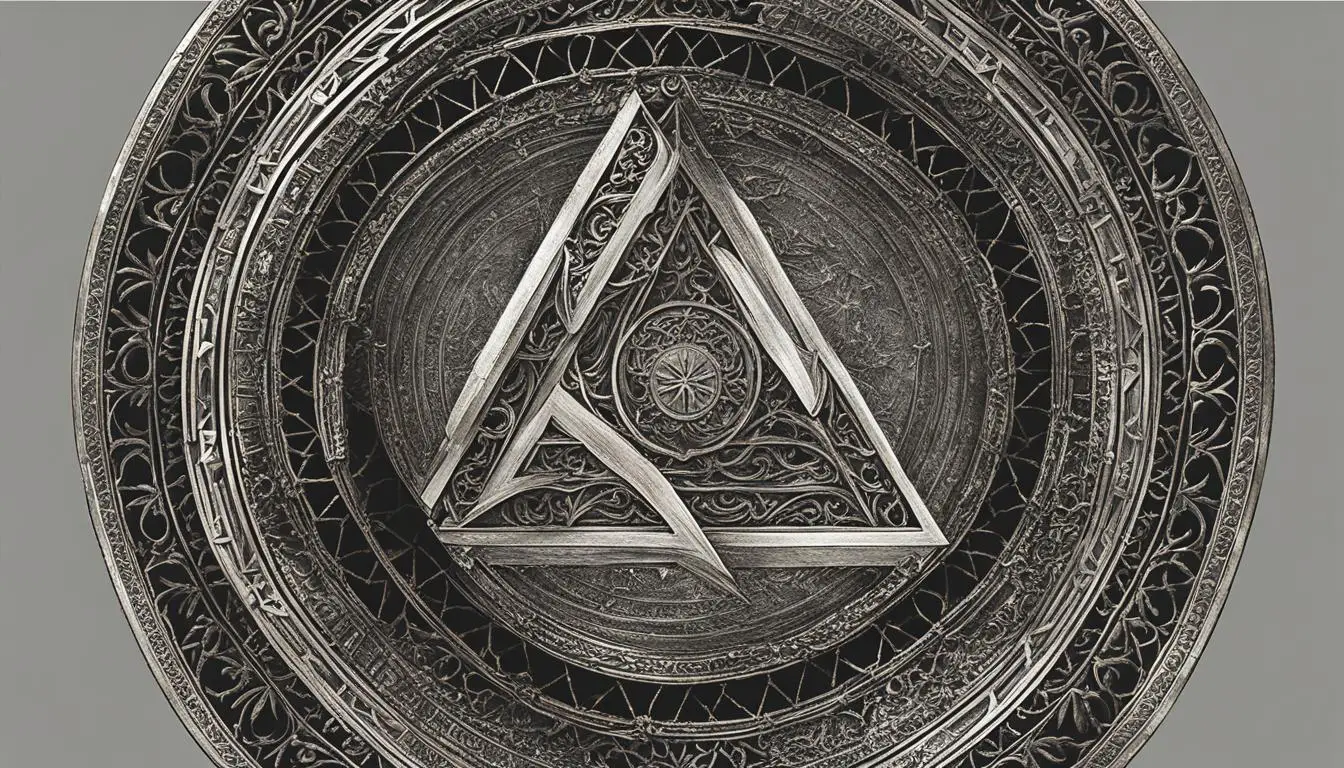When it comes to understanding the biblical definition of a quiver, it goes beyond a simple container for arrows. In biblical teachings, a quiver symbolizes much more than its physical form. It represents readiness, preparation, and the spiritual significance of battle or conflict. Let’s take a closer look at the meaning of a quiver in the Bible and explore its various aspects.
Key Takeaways:
- The biblical definition of a quiver goes beyond its physical form.
- A quiver symbolizes readiness, preparation, and the spiritual significance of battle.
- The word “quiver” originated from Middle English and has associations with protection and containment.
- In Hebrew, the word for quiver is “keli,” emphasizing its role as a vessel or container for arrows.
- In Greek, the word for quiver is “pharetra,” highlighting its connection to spiritual warfare and the believer’s readiness.
The Etymology of the Word “Quiver”
The word “quiver” has an interesting etymology that sheds light on its historical and symbolic meaning. It originated from Middle English, derived from the Old English word “cwifer” which means a “sheath” or “case.” This Old English term can be traced back to the Germanic word “kweifr,” which also means a “case” or “enclosure.”
From its etymology, we can infer that the word “quiver” is associated with the idea of protection and containment. Just as a quiver serves as a case or holder for arrows, it symbolizes the readiness and preparation for battle or conflict. It is a vessel that carries the tools of a warrior, representing their strength and readiness to face challenges.
The etymology of the word “quiver” reveals its deeper meaning as not just a physical object, but also a metaphorical representation of resilience, preparedness, and the ability to contain and protect. It underscores the significance of the quiver in biblical teachings and its spiritual connotations.
Table: Quiver Etymology
| Language | Word | Meaning |
|---|---|---|
| Middle English | Quiver | Derived from “cwifer,” meaning a “sheath” or “case” |
| Old English | Cwifer | Means a “sheath” or “case” |
| Germanic | Kweifr | Means a “case” or “enclosure” |
Quiver in Hebrew
In the Old Testament Hebrew, the word for quiver is “keli,” which means a “vessel” or “container.” It is often used metaphorically to refer to a container for arrows or the weapons of a warrior. The Hebrew word for quiver highlights its role as a tool for battle and protection.
Throughout the Old Testament, the concept of the quiver is mentioned in various contexts, emphasizing its significance in ancient Hebrew culture and warfare. The quiver represented a symbol of readiness and preparedness for battle, as well as a means of survival and defense.
One notable mention of the quiver in the Old Testament is found in Psalm 127:3-5 which states, “Children are a heritage from the Lord, offspring a reward from him. Like arrows in the hands of a warrior are children born in one’s youth. Blessed is the man whose quiver is full of them.”
Table: Symbolism of the Quiver in the Old Testament Hebrew
| Symbolism | Explanation |
|---|---|
| Preparedness | The quiver signifies being ready for battle or facing challenges. |
| Protection | It represents the defensive aspect of the warrior’s arsenal. |
| Provision | The quiver symbolizes God’s blessings and the fruitfulness of individuals or nations. |

“Like arrows in the hands of a warrior are children born in one’s youth. Blessed is the man whose quiver is full of them.” – Psalm 127:3-5
The use of the quiver in the Old Testament Hebrew reflects the importance of spiritual preparedness, relying on God’s provision and protection, and being ready to face the challenges of life. It serves as a reminder of the need for trust in God’s strength and guidance in times of battle or adversity.
Quiver in Greek
In the New Testament Greek, the word for quiver is “pharetra,” derived from the Latin term “pharetra.” The Greek word “pharetra” is used in the New Testament to convey the concept of spiritual warfare and the armor of God. It symbolizes the readiness and strength of believers in the face of spiritual battles.
“Put on the full armor of God, so that you can take your stand against the devil’s schemes. For our struggle is not against flesh and blood, but against the rulers, against the authorities, against the powers of this dark world and against the spiritual forces of evil in the heavenly realms.” – Ephesians 6:11-12
The usage of “pharetra” in the New Testament highlights the metaphorical representation of the quiver as a tool for spiritual battle. Just as a physical quiver holds arrows for a warrior, believers are encouraged to equip themselves with the armor of God to stand firm against the schemes of the enemy.
Table: Quiver in Greek
| Term | Definition |
|---|---|
| Pharetra | The Greek word for quiver in the New Testament. |
| Symbolism | Represents readiness and strength in spiritual battles. |
| Usage | Related to the armor of God and spiritual warfare. |
Biblical References to Quivers: Symbolism in the Bible
Throughout the Bible, quivers are mentioned in various contexts, revealing their symbolism and significance. These references highlight themes of warfare, protection, and provision, offering insights into the spiritual teachings found in scripture.
One notable verse that mentions quivers is Psalm 127:3-5, which states, “Children are a heritage from the Lord, offspring a reward from him. Like arrows in the hands of a warrior are children born in one’s youth. Blessed is the man whose quiver is full of them. They will not be put to shame when they contend with their opponents in court.” This passage uses the quiver as a metaphor for offspring, emphasizing the blessings that come from having many children.
“Like arrows in the hands of a warrior are children born in one’s youth.”
Genesis 27:3 also references a quiver, where Isaac instructs his son Esau to fetch his bow and quiver to go hunting. This passage reflects the practical use of a quiver as a container for arrows, highlighting its presence in ancient everyday activities.
These biblical references to quivers demonstrate their symbolism as representations of God’s blessings, the fruitfulness of individuals or nations, and the readiness for battles, both spiritual and physical.
Quiver in Biblical Stories
The quiver plays a significant role in various biblical narratives and stories, often symbolizing preparedness, trust, and reliance on God’s strength. One notable example is the story of David and Goliath, found in 1 Samuel 17. When facing the giant warrior Goliath, David, a young shepherd, chose not to wear King Saul’s armor but instead relied on his trusty sling and a stone from his shepherd’s bag. Though the quiver is not explicitly mentioned in this story, it represents David’s readiness and confidence in God’s power to overcome the seemingly insurmountable challenges he faced.
Another biblical story where the quiver features prominently is the account of the Israelites’ conquest of Jericho in Joshua 6. According to the narrative, God commanded Joshua and the Israelite army to march around the fortified city of Jericho for six consecutive days, with seven priests carrying seven trumpets of rams’ horns before the Ark of the Covenant. On the seventh day, they marched around the city seven times, and when the priests blew their trumpets, the walls of Jericho collapsed. In this story, the quiver represents the Israelites’ preparedness and trust in God’s supernatural intervention to bring down the enemy’s defenses.
“The quiver represents David’s readiness and confidence in God’s power to overcome the seemingly insurmountable challenges he faced.”
These stories, along with many others in the Bible, highlight the metaphorical significance of the quiver as a symbol of faith, readiness, and trust in God’s strength. They serve as reminders that believers should rely on God’s guidance and provision, even in the face of daunting circumstances and formidable adversaries.
| Biblical Story | Key Symbolism |
|---|---|
| David and Goliath (1 Samuel 17) | Quiver represents readiness and trust in God’s power. |
| Conquest of Jericho (Joshua 6) | Quiver symbolizes preparedness and reliance on God’s intervention. |
These biblical stories not only provide historical accounts but also offer lessons and insights for believers today. Just as David and the Israelites demonstrated unwavering trust in God’s strength and guidance, individuals facing challenges in their own lives can draw inspiration from these narratives and find encouragement in the symbolism of the quiver.

Scholarly Perspectives on Quiver: Insights from Biblical Studies
Interpreting the symbolism of the quiver in biblical teachings has been a subject of interest among scholars. While there are varying perspectives, these insights shed light on the multifaceted nature of this metaphorical representation.
1. Symbol of Readiness and Preparedness
Many scholars view the quiver as a symbol of readiness and preparedness for the spiritual battles faced by believers. Just as a quiver holds arrows that are ready to be used in combat, it signifies the importance of being spiritually equipped and vigilant in facing life’s challenges.
2. Metaphor for God’s Guidance and Spiritual Resources
Another interpretation focuses on the quiver as a metaphor for God’s guidance and the spiritual resources available to believers. Just as a quiver provides arrows to the warrior, it represents God’s provision and support in navigating the difficulties of life.
“The quiver symbolizes the believer’s reliance on God’s strength and the assurance of His protection in the face of adversity.” – Dr. Rebecca Johnson, biblical scholar
These interpretations highlight the significance of the quiver as a symbol that encourages believers to trust in God’s strength, remain prepared, and seek His guidance in their spiritual journey.
3. Representation of God’s Protection and Provision
Some scholars emphasize the quiver as a representation of God’s protection and provision. Just as a quiver safeguards and holds the arrows, it signifies the divine shelter and care that believers can rely on in times of need.
In summary, scholarly perspectives on the quiver in biblical studies bring about rich insights into its symbolic meaning. Whether seen as a symbol of readiness, divine guidance, or God’s protection, the quiver serves as a reminder of the believer’s reliance on God and their preparedness to face the challenges of life.
| Table: Scholarly Perspectives on Quiver | |
|---|---|
| Interpretation | Key Focus |
| Symbol of Readiness and Preparedness | Emphasizes the importance of being spiritually equipped and vigilant in facing life’s challenges. |
| Metaphor for God’s Guidance and Spiritual Resources | Highlights the significance of God’s provision and support in navigating the difficulties of life. |
| Representation of God’s Protection and Provision | Serves as a reminder of the divine shelter and care available to believers. |
Quiver: Right and Wrong Interpretations
Interpreting biblical concepts can be a complex task, with differing opinions and interpretations often arising. The same holds true for the symbolism of the quiver in the Bible. Some interpretations focus on the physical aspect of the quiver and its ancient role in warfare, while others emphasize its spiritual significance and representation of God’s provision and protection.
Those who view the quiver in a literal sense highlight its function as a container for arrows, emphasizing the preparation and readiness for physical battle. They see it as a symbol of the warrior’s strength and skill in combat.
On the other hand, the spiritual interpretation of the quiver emphasizes its metaphorical meaning. It is seen as a representation of God’s provision and protection, reminding believers to trust in His strength. The quiver symbolizes preparedness for the spiritual battles faced in everyday life, rather than a call to physical warfare.
“The correct interpretation of the quiver lies in understanding its metaphorical significance, representing the believer’s readiness and dependence on God’s provision and protection in spiritual battles.”
While both perspectives have their merits, it is important to consider the broader context of biblical teachings when interpreting the role of the quiver. The quiver serves as a reminder that believers should be prepared, both physically and spiritually, to face the challenges and trials of life. It represents trust in God’s strength and guidance, regardless of the specific interpretation.
Table: Comparing Interpretations of the Quiver
| Interpretation | Focus | Key Message |
|---|---|---|
| Literally | Physical aspect, ancient warfare | Preparation for physical battle |
| Spiritually | Metaphorical representation | God’s provision and protection in spiritual battles |
Ultimately, the interpretation of the quiver in the Bible may vary, but its significance lies in its representation of preparedness, trust, and dependence on God. Whether viewed literally or metaphorically, the quiver reminds believers to be ready for the challenges they may face and to rely on God’s strength and guidance.
Quiver in Today’s World
In modern times, the quiver may not be used as a literal tool for warfare, but its spiritual symbolism continues to hold relevance. Many believers interpret the quiver as a symbol of preparedness, trust in God’s provision, and readiness for spiritual battles in their daily lives. It serves as a reminder to remain steadfast, relying on God’s strength and guidance in the face of challenges.
The contemporary understanding of the quiver goes beyond its physical representation as a container for arrows. It emphasizes the need to be spiritually equipped and discerning, ready to face the struggles and temptations of the world. The quiver reminds believers to keep their focus on God, seeking His wisdom and relying on His power to overcome adversity.
While the use of quivers in warfare has become obsolete, its symbolism endures as a powerful metaphor. Just as a quiver holds arrows for a warrior’s use, believers are called to be equipped with spiritual tools such as prayer, the Word of God, and the armor of faith. The quiver serves as a visual representation of the believer’s preparedness and reliance on God’s provision in navigating the spiritual battles of life.
The relevance of the quiver in today’s world lies in its ability to inspire believers to adopt a mindset of readiness and trust. By embracing the symbolism of the quiver, individuals can find strength in their faith and draw closer to God, knowing that He is their ultimate source of protection and provision.

Different Opinions on the Quiver
The interpretation of the quiver in the Bible can vary among individuals and religious denominations. Some may view it as a literal representation of weapons, while others may see it as a metaphorical symbol of God’s protection and provision. These diverse views add depth to the understanding of the quiver’s significance in biblical teachings.
When discussing the symbolism of the quiver, it is important to consider the context of the passage and the broader themes within the Bible. Some scholars argue that the quiver represents readiness and preparedness for spiritual battles, emphasizing the believer’s reliance on God’s strength. Others may interpret the quiver as a reminder of God’s provision and protection, illustrating His care for His people.
In addition to individual interpretations, different religious denominations may also have unique perspectives on the meaning of the quiver. These interpretations can reflect specific theological beliefs and cultural contexts. The variety of opinions surrounding the symbolism of the quiver adds richness and diversity to the overall understanding of its significance in biblical teachings.
Quiver: A Symbol of Spiritual Preparedness
The quiver, as portrayed in the Bible, carries a profound spiritual significance, symbolizing preparedness for the battles of life. It represents a readiness to face challenges and a reliance on God’s strength and protection. Just as a quiver holds arrows for a warrior, it reminds us to be prepared with the necessary resources for spiritual warfare.
In Psalm 127:3-5, the quiver is compared to children, highlighting the blessings and fruitfulness that God provides. This metaphor emphasizes the importance of being spiritually equipped to raise and nurture the next generation, instilling the values and teachings of God.
Throughout biblical narratives, we see examples of individuals prepared and equipped for battles. David, for instance, faced the formidable challenge of Goliath with unwavering trust in God’s strength. He used his sling and stones, drawn from his quiver, to defeat his enemy. This story serves as a powerful reminder of the importance of preparedness and reliance on God’s guidance in times of adversity.
| Key Points | Spiritual Significance |
|---|---|
| 1. Quiver as a container for arrows | Symbolizes readiness and preparedness for spiritual battles |
| 2. Metaphorical representation of God’s provision and protection | Emphasizes trust in God’s strength and guidance |
| 3. Comparison to children in Psalm 127:3-5 | Highlights God’s blessings and fruitfulness |
| 4. Quiver in the story of David and Goliath | Illustrates the importance of preparedness and reliance on God |
Overall, the quiver symbolizes the spiritual preparedness needed to navigate life’s challenges. It serves as a constant reminder of God’s provision and protection, urging believers to trust in His strength and be ready to face the struggles of life with unwavering faith.
Conclusion
The biblical definition of the quiver encompasses its physical and metaphorical representations. It symbolizes readiness, provision, and protection in the context of ancient warfare and spiritual battles. Interpretations of the quiver may vary, but its spiritual significance remains consistent in emphasizing preparedness and trust in God’s strength.
The etymology of the word “quiver” traces its origins back to Middle English and Old English, highlighting its association with the idea of protection and containment. In Hebrew, the word for quiver is “keli,” emphasizing its role as a vessel or container for arrows. In Greek, the word “pharetra” conveys the concept of spiritual warfare and the believer’s readiness and strength.
The Bible contains numerous references to quivers, illustrating their symbolism in relation to God’s blessings, fruitfulness, and provision. Quivers are also mentioned in various biblical stories, highlighting the preparedness and trust in God’s strength displayed by individuals like David in the face of challenges.
Scholars offer varying perspectives on the quiver, ranging from a literal understanding of its role in ancient warfare to a metaphorical representation of God’s protection and provision. Different opinions and interpretations add depth to the understanding of the quiver’s significance in biblical teachings.
In today’s world, the physical use of quivers for warfare is rare, but the spiritual symbolism of the quiver remains relevant. Many believers see the quiver as a symbol of preparedness, trust in God’s provision, and readiness for spiritual battles in their daily lives.
Overall, the biblical understanding of the quiver highlights its spiritual significance as a symbol of preparedness, provision, and protection. It reminds believers to trust in God’s strength and be ready to face the struggles of life with reliance on His power.
FAQ
What is the biblical definition of a quiver?
In the Bible, a quiver is a container or holder for arrows. It symbolizes readiness and preparation for battle or conflict.
Where does the word “quiver” come from?
The word “quiver” originated from Middle English, derived from the Old English word “cwifer” which means a “sheath” or “case.” It can be traced back to the Germanic word “kweifr,” which also means a “case” or “enclosure.”
What is the Hebrew word for quiver?
The Hebrew word for quiver is “keli,” which means a “vessel” or “container.” It is often used metaphorically to refer to a container for arrows or the weapons of a warrior.
What is the Greek word for quiver?
The Greek word for quiver is “pharetra,” which is derived from the Latin term “pharetra.” It symbolizes the readiness and strength of the believer in the face of spiritual battles.
How is the quiver mentioned in the Bible?
The Bible contains several references to quivers, primarily in the context of warfare, protection, and God’s provision. Verses such as Psalm 127:3-5 and Genesis 27:3 illustrate the symbolism of the quiver as a representation of God’s blessings and the fruitfulness of individuals or nations.
Are there any biblical stories that feature the quiver?
Yes, quivers are mentioned in various biblical stories, particularly in the accounts of warriors and battles. One example is the story of David and Goliath, where David uses a sling and a stone from his shepherd’s bag to defeat Goliath. The quiver represents David’s preparedness and trust in God’s strength.
How do scholars interpret the quiver in the Bible?
Scholars interpret the quiver in different ways, ranging from a literal understanding of its role in ancient warfare to a metaphorical representation of God’s provision and protection. It is important to consider the broader context of biblical teachings when interpreting the role of the quiver.
What are the different views on the interpretation of the quiver?
There are differing opinions regarding the interpretation of the quiver in the Bible. Some interpretations focus on its physical aspect and its role in ancient warfare, while others emphasize its spiritual symbolism, highlighting its representation of God’s provision and protection.
How is the quiver relevant in today’s world?
While the quiver is not typically used as a literal tool for warfare in modern times, its spiritual symbolism still holds relevance. Many believers see the quiver as a symbol of preparedness, trust in God’s provision, and readiness for spiritual battles in their daily lives.
Do different individuals and religious denominations interpret the quiver differently?
Yes, the interpretation of the quiver in the Bible can vary among individuals and religious denominations. Some may view it as a literal representation of weapons, while others may see it as a metaphorical symbol of God’s protection and provision. These diverse views add depth to the understanding of the quiver’s significance in biblical teachings.
What does the quiver symbolize?
The quiver in the Bible symbolizes preparedness, provision, and protection in the context of ancient warfare and spiritual battles. It serves as a reminder of God’s provision, protection, and guidance in the face of challenges, encouraging believers to trust in His strength.








Leave a Reply